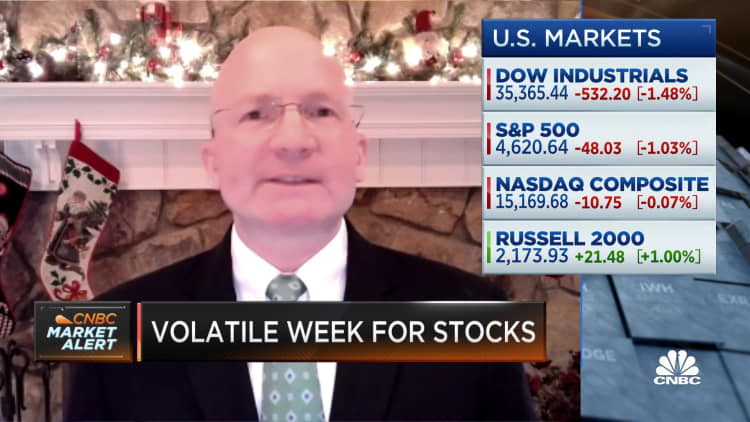
U.S. stocks came under pressure again in Friday's volatile session amid worries about tighter monetary policy and the ongoing pandemic, leading to a losing week for the major averages.
The Dow Jones Industrial Average dropped 532.20 points, or 1.5%, to 35,365.44. The S&P 500 fell 1% for a second down day to 4,620.64. The tech-heavy Nasdaq Composite ended the session less than 0.1% lower at 15,169.68 after briefly trading in the green. At its session low, the Nasdaq dropped about 1.5%.
The major averages posted a negative week with the Nasdaq being the biggest loser. The tech-heavy benchmark declined nearly 3%, while the Dow and the S&P 500 slipped 1.7% and 1.9%, respectively.
Friday coincided with the expiration of stock options, index options, stock futures and index futures — a quarterly event known as "quadruple witching" that typically comes with heightened volatility.
The S&P financial sector was the biggest laggard on Friday with a 2.3% loss after bank stocks outperformed in the previous session. Goldman Sachs lost nearly 4%, while Bank of America and JPMorgan both lost over 2%.
Many mega cap tech shares registered steep losses this week. Microsoft dipped 0.3% Friday, bringing its weekly decline to nearly 5.5%. Alphabet and Apple fell more than 4% this week.
Shares of one-time EV darling Rivian tumbled more than 10% Friday after the truck maker said it will fall short of its 2021 production target.
Investors appeared to be rotating from high-growth tech names to consumer staples, as they continued to digest the latest move by the Federal Reserve along with rising inflation and the spread of the omicron Covid variant.
"As the Federal Reserve turns more hawkish and expectations for higher interest rates rise, investors are lowering exposure to growth stocks," said Jim Paulsen, chief investment strategist at The Leuthold Group. "Typically, growth stocks exhibit a higher duration compared to value stocks because a higher proportion of their cash flows will be received in the more distant future."
FedEx shares jumped almost 5% after quarterly earnings and revenue results topped expectations and it announced a $5 billion buyback. The shipper also reinstated its original 2022 EPS forecast.
Covid-19 vaccine makers Moderna and Pfizer notched weekly returns of 14.7% and 12.7%, respectively, making them standouts in the S&P 500.
Earlier this week, the Fed announced a more aggressive plan to wind down its asset purchases, and that it is looking at hiking rates multiple times in 2022.
"Trading will remain very choppy for the rest of the year as investors grapple with falling trading volumes over the coming sessions," said Edward Moya, senior market analyst at Oanda.


